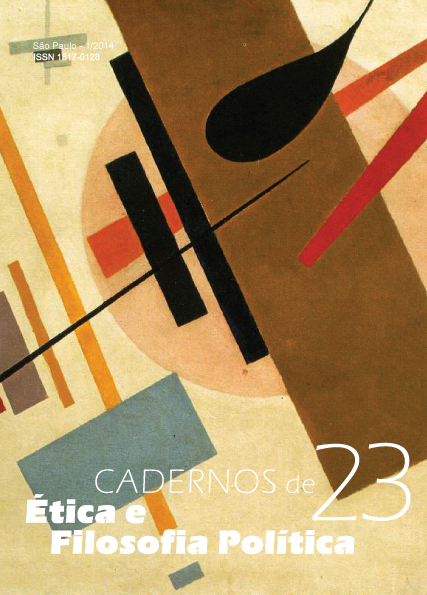AMERICAN AND FRENCH REVOLUTIONS: A FIGHT FOR LIBERTY OR LIBERATION?
DOI:
https://doi.org/10.11606/issn.1517-0128.v2i23p64-77Keywords:
Liberty, Liberation, Hannah Arendt, American Revolution, French RevolutionAbstract
This paper aims at understanding the difference between the concepts of liberty and liberation from Hannah Arendt’s analysis of the American and French Revolutions in On Revolution. Such differentiation may redeem the legacy of the American and French Revolutions and the meaning of politics for the contemporary world. According to Arendt, the men of the American and French Revolutions were thrown into public action by their acts of liberation, gradually building the space of liberty and, at the same time, prepared and took a taste for action. Thus, the novelty that the revolution brought these men was precisely the unknown experience of being free and able to start something new in the public world. So, the relevance of the American and French Revolutions is based on the idea of freedom and not only on gaining civil rights - the right to assemble and petition and the right to mobility. Arendt asserts that it is only possible to speak of revolution when the idea of freedom – the pathos of novelty - is linked to the idea of change, that is, of a new principle that gives rise to a new politic body. The idea of freedom may be confused with the idea of liberation of any form of protection; however, even though the border between liberty and liberation is subtle and raises some uncertainty, the concepts are not the same. The achievements of liberation cannot abridge the history of liberty and, more importantly, cannot guarantee the effectiveness of political activity and the establishment of the public domain in the world. If the struggle for liberation - getting rid of the guardianship of religion or absolutist governments - cannot be confused with the struggle for freedom, and this - the fight for freedom –in fact marks revolutions, then the issue becomes more serious when the struggle for liberation is undermined by more urgent or personal struggles such as satisfaction of vital needs, in the case of the French Revolution, or satisfaction of personal well-being, in the case of the American Revolution. How to put political action and freedom into effect if the concern is with vital or personal interests?Downloads
Download data is not yet available.
Downloads
Published
2013-07-03
Issue
Section
Dossiê do I Encontro de Filosofia Política Contemporânea
License
Copyright (c) 2013 Maria Cristina Müller

This work is licensed under a Creative Commons Attribution-ShareAlike 4.0 International License.
How to Cite
Müller, M. C. (2013). AMERICAN AND FRENCH REVOLUTIONS: A FIGHT FOR LIBERTY OR LIBERATION?. Cadernos De Ética E Filosofia Política, 2(23), 64-77. https://doi.org/10.11606/issn.1517-0128.v2i23p64-77


